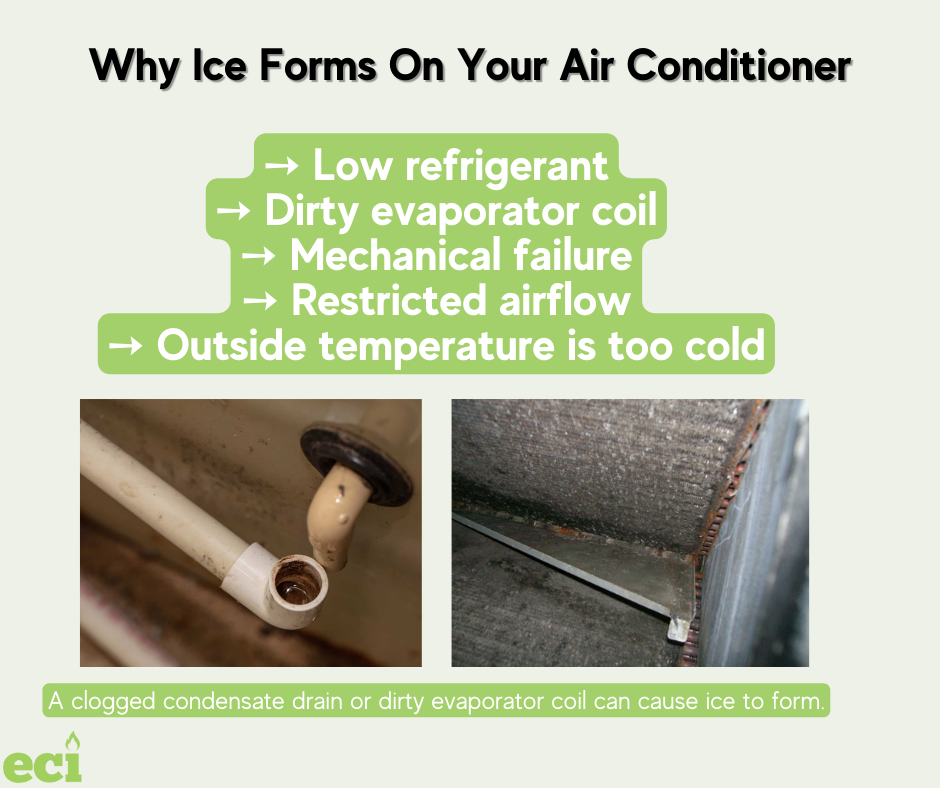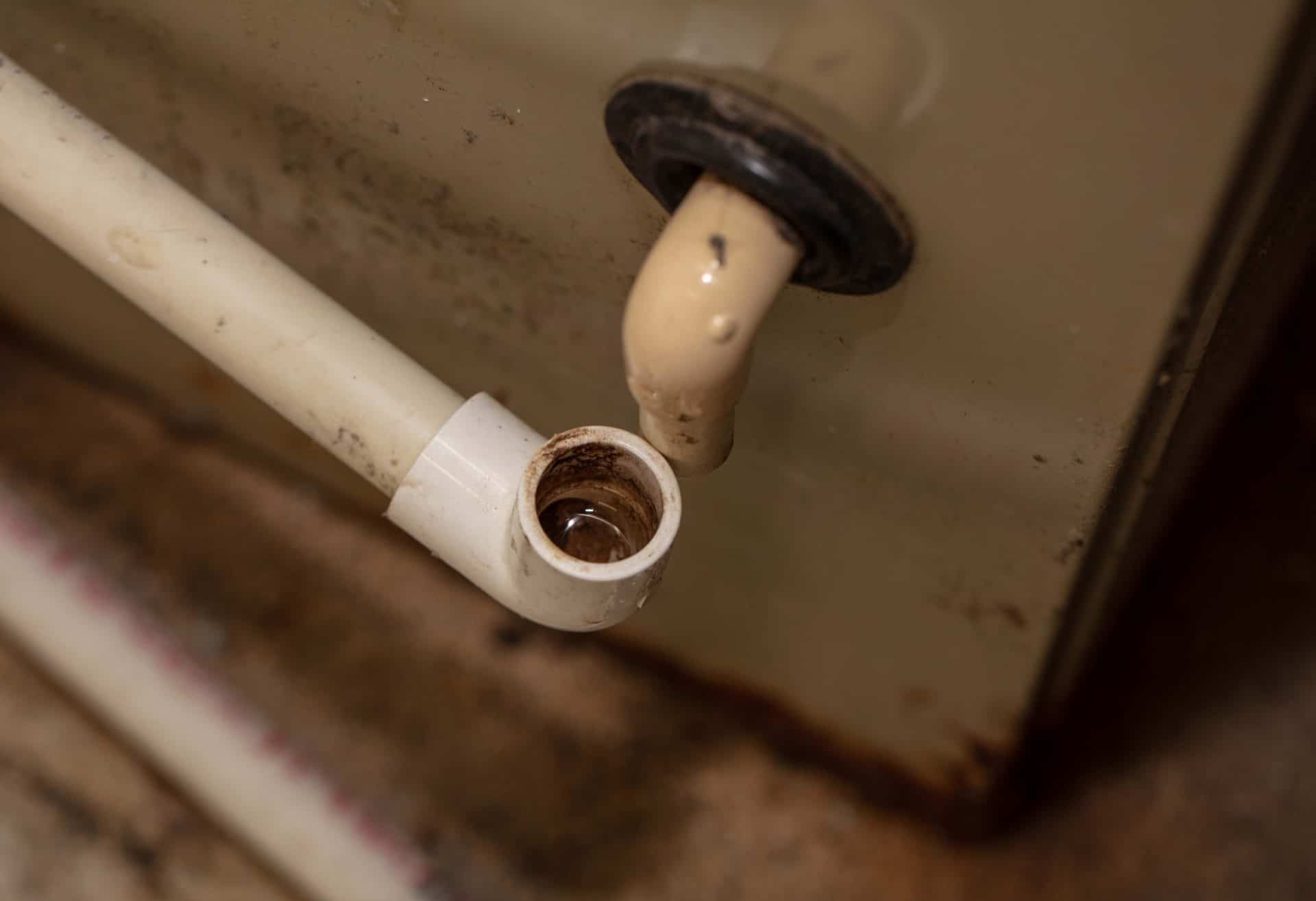There's nothing better than an icy drink or an ice cream cone on a sweltering summer day; except, maybe, stepping inside to your cool, air-conditioned home. When it comes to your AC, ice is one thing you don't want. Funnily enough, ice in your AC unit will cause the system to function improperly and actually stop blowing cold air into your home. So what causes ice to form and how can you fix it?
 Why Ice Forms on Your AC
Why Ice Forms on Your AC
Low refrigerant
Cause
If the refrigerant in your air conditioner is low, you may have a leak or incorrect charge. When air passes over your unit's evaporator coil, heat and humidity are removed from the air and condensation forms. When an air conditioner is low on refrigerant or charged incorrectly, the coils containing the refrigerant get too cold due to a pressure imbalance, causing the refrigerant to absorb a much greater amount of heat than it normally would. This causes ice to build up on the coils and refrigerant lines.
Solution
Refrigerant leaks are fairly common and can be fixed by having a qualified HVAC contractor repair the leak and recharge the coolant. Oftentimes, a leak is due to a cracked coil. If this is the case, a technician can patch up the crack and top off the refrigerant. In other cases, you may need to fully replace the coil.
Prevention
Preventative maintenance is key to making sure your HVAC system is running properly. By scheduling a tune-up every spring, you ensure that potential problems are caught and fixed before they become worse.

Dirty evaporator coil
Cause
A dirty evaporator coil may also be to blame for ice on your AC unit. After your thermostat detects that cool air is needed in your home, warm air is drawn in through a vent and blown over the evaporator coil. As the liquid refrigerant inside the evaporator coil converts to gas, heat from the indoor air is absorbed into the refrigerant, thus cooling the air as it passes over the coil. A grimy coil will restrict this airflow through the unit.
Solution
Have your local HVAC company inspect and clean the coil or replace it if need be. Until then, shut the unit off to prevent damage or a breakdown.
Prevention
To avoid this issue, simply make sure that the evaporator coil stays clean. Again, this can be prevented by scheduling annual maintenance, where your air conditioning unit is inspected and cleaned thoroughly.
Mechanical failure
Cause
There are various types of mechanical issues that may cause ice to form in your air conditioning unit, such as faulty wiring. If your AC keeps running for a long time after your home reaches the set temperature, you could have problems with your thermostat or an electrical issue in your outdoor unit. Ice forms when your compressor keeps working after your fan stops and air quits flowing.
A damaged blower fan may also be the culprit. If the fan isn't functioning properly, the system will develop issues with airflow and pressure, causing the refrigerant lines or condensation that forms on the coils to freeze. Broken valves, kinked refrigerant lines, and blocked drains are other possible causes of ice on your unit, too.

Solution
Like the other causes of ice on your air conditioner, you should have a professional inspect and repair the unit.
Prevention
You should obviously start with having a qualified contractor install your AC system properly. After that, you should make sure to keep up with annual maintenance to prevent problems before they occur.

Restricted airflow
Cause
Air conditioners rely on air flowing through the system easily. Lack of airflow will reduce the temperature and cause the unit to freeze up. Dirty air filters, clogs or leaks in the ductwork, closed vents, or blockage around the outdoor unit can all restrict airflow.
Solution
Once you find out what's causing the restricted airflow, you or your HVAC company should be able to perform a simple fix. The air filter may simply need to be cleaned or changed, or vents may need to be opened up. Your ductwork may need to be cleaned or sealed as well. Lastly, you may need to remove any plants around your condenser or debris/dirt on the condenser.
Prevention
Changing the air filter regularly will prevent restricted airflow as well as increase your home's indoor air quality. It can also be changed by the technician during your annual tune-up

Outside temperature is too cold
Cause
Simply put, air conditioners weren't designed to be used when the temperatures is around 62 degrees or below.
Solution
Turn off the air conditioning to allow it to thaw.
Prevention
Do not run your AC for extended periods of time when the outdoor temperature is in or below the low 60's.
How to Know if There's Ice In Your AC Unit
Besides actually seeing ice on your outdoor unit, there are ways to tell that your AC system may be frozen. While it sounds counterintuitive, your may notice that your AC is blowing warm air. That's because if any components are frozen, they won't be able to properly assist in the process of producing and blowing cool air.
If you find that your air filter is dirty and your AC isn't working, that can also be a sign of an icy component somewhere. If you see any leaks, it's possible that the dirty filter or low refrigerant charge caused ice to form and water to drip.
If you live in the Delaware Valley/Greater Philadelphia area and would like to find comfort within your home, visit our website or give us a call at 215 - 245 - 3200 to learn more.



